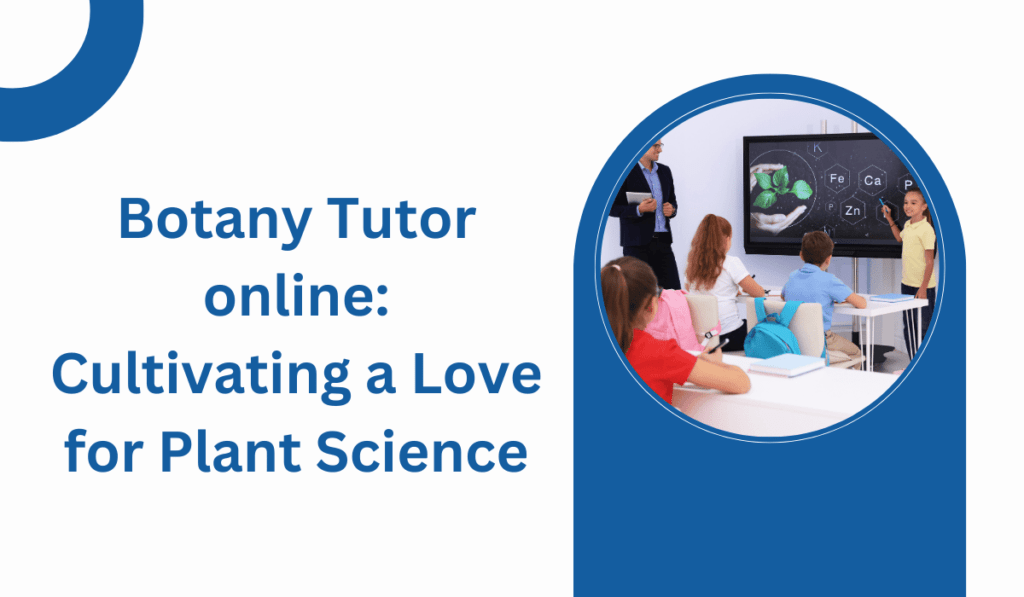What is Botany?
Botany is a part of biology that focuses on plants. It covers many areas, including how plants work, their structure, genetics, ecology, and their importance to humans.
Key Areas of Botany:
- Plant Physiology: How plants function
- Plant Ecology: How plants interact with their surroundings
- Plant Taxonomy: Classifying and naming plants
Plants are important in our daily lives. They provide food, medicine, and oxygen. Learning about plants helps us understand why they are essential.
Why Botany Education is Important
Studying botany helps us understand science and nature better. Here are some benefits:
- Critical Thinking: Understanding plant systems improves problem-solving skills.
- Environmental Awareness: Knowing about plants helps us take care of the environment.
- Practical Uses: Botany knowledge is used in farming, gardening, and medicine.
Botany education shows us how plants keep our planet healthy.

Challenges in Learning Botany
Many students find botany hard. Here are some common problems:
- Complex Words: Scientific names and terms can be confusing.
- Lack of Interest: Traditional methods may not capture interest.
- Misunderstandings: Some think plants are boring or not important.
These challenges can make it hard for students to stay interested in botany.
Benefits of Botany Tutoring
Botany tutoring offers a personal learning experience. Tutors can adjust lessons to match the student’s pace and style. Here are some benefits of botany tutoring:
- Interactive Learning: Hands-on activities make learning fun and memorable.
- Custom Lessons: Tutors can focus on areas where students need the most help.
- Encouragement and Support: Tutors provide motivation and confidence.
Success Stories:
- Students who were once not interested in botany now do well in their classes.
- Better grades and a deeper understanding of plant science.
Tutoring helps students overcome challenges and develop a love for botany.
Fun Activities for Botany Tutor Online
Effective botany tutoring includes fun activities. Here are some ideas:
- Experiments: Dissect flowers or grow plants from seeds.
- Field Trips: Visit botanical gardens or nature reserves.
- Technology: Use apps and virtual labs to study plants.
- Creative Projects: Build a mini-ecosystem or create a plant journal.
Example Table: Plant Growth Experiment
| Week | Observation | Height (cm) |
| 1 | Seedling | 2 |
| 2 | Two leaves | 4 |
| 3 | More leaves | 6 |
| 4 | Buds | 8 |
These activities make learning botany fun and engaging.
Tips for Effective Botany Tutoring
Here are some tips to make botany tutoring effective:
- Set Clear Goals: Define what you want to achieve.
- Use Simple Words: Explain complex ideas in simple terms.
- Encourage Questions: Promote curiosity and exploration.
- Provide Feedback: Regularly review progress and give positive reinforcement.
- Make it Fun: Use games and activities to keep students engaged.
By following these tips, tutors can create a positive learning environment.
Resources for Botany Students
Here are some resources to help students learn botany:
- Books: “Botany for Kids” by J. Doe
- Websites: Plant Biology
- Online Courses: Khan Academy
Local Resources:
- Botanical Gardens
- Nature Clubs
These resources provide extra help for botany students.
Real-life Applications of Botany
Botany is not just an academic subject; it has real-life uses that can inspire students. Here are some ways botany is used in different fields:
- Agriculture: Understanding plant growth and genetics helps improve crop yields and develop sustainable farming practices.
- Medicine: Many medicines come from plants. Knowing about plant chemistry and properties is crucial in medicine.
- Environmental Conservation: Botanists play a key role in preserving biodiversity and restoring damaged ecosystems.
By highlighting these applications, tutors can show students the practical importance of botany.

Botany and Everyday Life
Plants are all around us and play a crucial role in our daily lives. Here are some examples of how plants impact our everyday activities:
- Food: Fruits, vegetables, grains, and spices all come from plants. Understanding plant growth can help us make healthier food choices.
- Clothing: Many fabrics, such as cotton and linen, are made from plants.
- Home Décor: Houseplants not only beautify our living spaces but also improve air quality.
Recognizing the presence and importance of plants in daily life can make botany more relatable and interesting for students.
Promoting a Green Thumb: Gardening Tips for Beginners
Gardening is a hands-on way to learn about plants. Here are some beginner tips to help students get started with gardening:
- Choose the Right Plants: Start with easy-to-grow plants like herbs, lettuce, or marigolds.
- Understand Plant Needs: Learn about the water, light, and soil requirements of different plants.
- Observe and Record: Keep a gardening journal to track plant growth and changes.
Example Table: Simple Plant Care Guide
| Plant | Watering Frequency | Light Requirement | Soil Type |
| Basil | Every 2-3 days | Full sun | Well-drained |
| Lettuce | Every 4-5 days | Partial shade | Moist |
| Marigold | Every 3-4 days | Full sun | Well-drained |
Gardening provides a practical, hands-on way to apply botanical knowledge and foster a deeper connection with plants.
Exploring Botany Through Technology
Technology offers new ways to study botany. Here are some tech tools and resources that can enhance botany learning:
- Virtual Labs: Simulate plant experiments online.
- Educational Apps: Use apps like PlantSnap to identify plants and learn about their characteristics.
- Online Databases: Access vast information on plant species and their uses through online databases like the Plant List.
Using technology in botany tutoring can make learning more dynamic and accessible.
Building a Mini-Ecosystem: A Fun Project
Creating a mini-ecosystem is a fun way to learn about plant interactions and ecosystems. Here’s a simple guide to building one:
- Materials Needed: A clear container, soil, small plants, pebbles, and water.
- Steps:
- Layer pebbles at the bottom for drainage.
- Add a layer of soil on top.
- Plant small plants in the soil.
- Water the plants lightly.
- Cover the container and place it in indirect sunlight.
Example Table: Mini-Ecosystem Observations
| Day | Observation |
| 1 | Plants are settling in. |
| 7 | New growth observed. |
| 14 | Plants are thriving. |
This project helps students understand plant growth, ecosystems, and the importance of environmental conditions.
Encouraging Exploration and Curiosity
Encouraging exploration and curiosity is crucial in botany tutoring. Here are some ways to inspire students:
- Nature Walks: Take walks in local parks or forests to observe plants in their natural habitats.
- Plant Journals: Keep a journal to document plant observations and questions.
- Botany Clubs: Join or form a botany club to share knowledge and experiences with peers.
These activities promote a hands-on and curious approach to learning about plants.
Conclusion
Botany is a fascinating and vital science that helps us understand the world of plants. Botany tutoring can help students overcome challenges, build confidence, and develop a love for plants. Interactive lessons, hands-on activities, and personalized support make learning fun and engaging. By inspiring curiosity and exploration, tutors can nurture the next generation of botanists. For more information on botany tutoring services, visit TutorLinkers Botany Tutoring. With the right support, students can appreciate the essential role plants play in our lives and the environment.
Ehsan Ali is a seasoned content writer and researcher with a talent for translating complex concepts into clear, engaging content. With a deep understanding of human behavior, societal trends, and technical topics, Ehsan creates insightful and impactful content that resonates with a broad audience. His expertise ensures that each piece is both accessible and compelling, bridging the gap between intricate details and everyday understanding.




